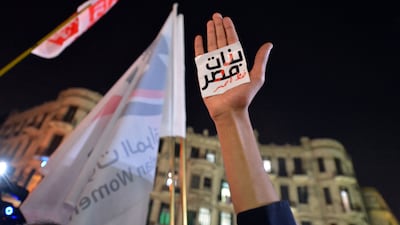When Naira Ashraf's throat was slit on a busy street in the Nile Delta city of Mansoura on June 20, Egyptians were horrified.
Millions of social media users viewed a horrifying video of her murder by a man whose romantic advances she had rejected.
A few days later, the body of Egyptian television presenter Shaimaa Gamal, who had been missing for two weeks, was found buried in a private residence on the outskirts of Cairo. She had suffered severe head injuries and her face was disfigured by nitric acid.
Investigations revealed that her husband, a State Council judge, had murdered her over “marital differences”.
Days later, another murder took place in the agricultural province where Ashraf lost her life. There, a man slit his wife’s throat over marital differences.
The murders have raised questions as to why there appears to be an increase in crimes against women in the Arab world’s most populous nation.

The National spoke to Amel Fahmy, managing director of Tadwein Centre for Gender Studies, which documents crimes against women and provides access to statistics on them.
“There does seem to be a marked increase in the number of violent crimes against women right now,” Ms Fahmy says. “But it’s important to note that violence against women was always somewhat rampant in Egypt.”
Impunity
Ms Fahmy’s research suggests that the current state of Egypt’s economy may be a contributing factor to an increase in attacks.
“We have conclusively determined that there is a strong correlation between poverty and domestic violence, and when you look at how expensive everything has got over the past few months, that creates a lot of pressure on families, which can make men become more violent towards the women in their lives,” she says.
Egypt does not have a comprehensive law that prohibits violence against women. This angers activists, who say there is more gender-based violence because there is a lack of serious consequences for perpetrators.
Violent crimes against women are usually dealt with on a case-by-case basis and there is no protocol on how to deal with them in a way that offers protection to women.
Marital rape is not punishable by law because of common perceptions that men have the right to sexual intercourse with their wives whenever they like.
“Until today, violent crimes against women are recorded in police stations under 'violence' with no mention of the fact that it was against a woman. This makes our jobs as researchers in this field much more difficult,” Ms Fahmy says.
“Men face little to no consequences when they are violent with women, unless it’s particularly egregious, like in Naira’s case.”
She says that Egypt’s rate of domestic violence is equal to the international average, citing a 2016 Demographic Health Survey which determined that one in four women is subjected to violent crime in a domestic setting.
“Developed countries and even many developing countries, particularly in Latin America, have implemented successful protection protocols for women which have mitigated the rate of gender-based violence there,” she says. “This regrettably is not the case in Egypt yet.”
Deeply rooted patriarchal thinking
The National also spoke with filmmaker and activist Aida El Kashef, who draws a strong parallel between a conservative trend in Egyptian religious discourse that began in the late 1970s and violence against women.
“However, today, we have religious figures coming out with statements that are directly inciting violence against women and it has become somewhat of a norm,” Ms El Kashef says.
After Ashraf’s murder, a professor of Islamic law at Al Azhar suggested that her clothes, which he deemed less than modest, contributed to her murder.
“Economic factors are undeniably contributing to this recent increase, but what people mustn't forget is that external pressures only make people more violent, it does not determine who they direct that violence against,” Ms El Kashef says.
“The fact that the violence is directed towards women is what needs to be explored here.”
The country’s male police officers, judges, civil servants and religious clerics are brought up with these patriarchal values and often cannot put them aside when doing their jobs, Ms El Kashef says.
Following a televised statement made by Ashraf’s killer, in which he attempted to reason away his crime, there was an outpouring of sympathy for him on social media.
Ms Fahmy says that this was because many Egyptian men related to the killer’s anger towards his victim and his inability to accept rejection.
“When a woman above 21 and no longer under her father’s will visits a police station to report that she is being beaten by him, officers will most often call her father, the very guy she is filing a report against, to come and pick her up, since they believe it’s a family matter that should be resolved privately,” Ms El Kashef says.
Social media: a double-edged sword
During a lengthy plea made by a prosecutor in the second hearing for Ashraf’s killer, who on Tuesday, June 28, was sentenced to death, he urged the nation’s youth to return to traditional values the Egyptians “inherited from the Quran and the Bible equally”.
The televised plea also criticised social media (which the killer used to harass Ashraf and threaten her life), calling it an inappropriate way for Egyptian youngsters to meet or talk to each other and a means of exposing them to ways of life that are not in line with the traditional mores of the country.

However, many Egyptian women’s rights activists do not share this view of social media since it has helped bring attention to the crimes committed against women in the country. They say it was instrumental in reporting sexual harassment incidents in 2020, during a period that has since been described as Egypt’s #MeToo movement.
“Social media is a double-edged sword for women in Egypt,” Ms Fahmy says.
“On the one hand, it has been an invaluable tool when it comes to reporting gender-based crimes, but on the other, it has also exposed many women to cyber attacks from men who share the women’s private photos or threaten them with blackmail."
Ms El Kashef points out that “we mustn't forget that the small wins that women have made over the past few years are probably one of the main reasons they are being subjected to such aggression now.
“Opposers of this success are more anxious and desperate than ever to bring women down.”
She explains that social media has provided a channel for people to see that other ways of life are possible and that they don’t have to live the way their parents did.
She thinks that the newer ways of thinking, shared and viewed by millions on social media, are going to win the fight against rigid, patriarchal traditions.
“Every new generation that comes in makes small gains, that is undeniable. So, in my opinion, it’s only a matter of time before the old ways are completely gone.
“This is why they are getting so aggressive now. They know they are powerless to stop it.”


